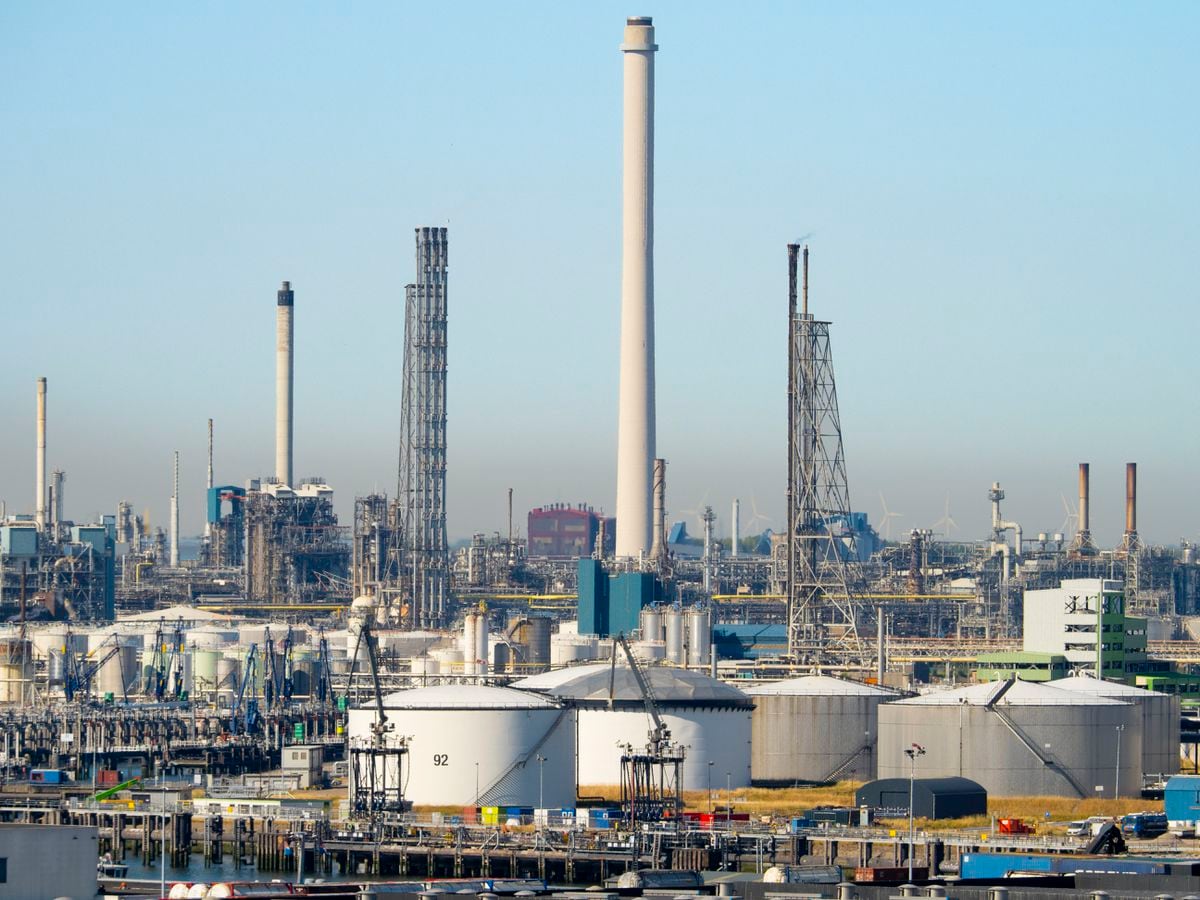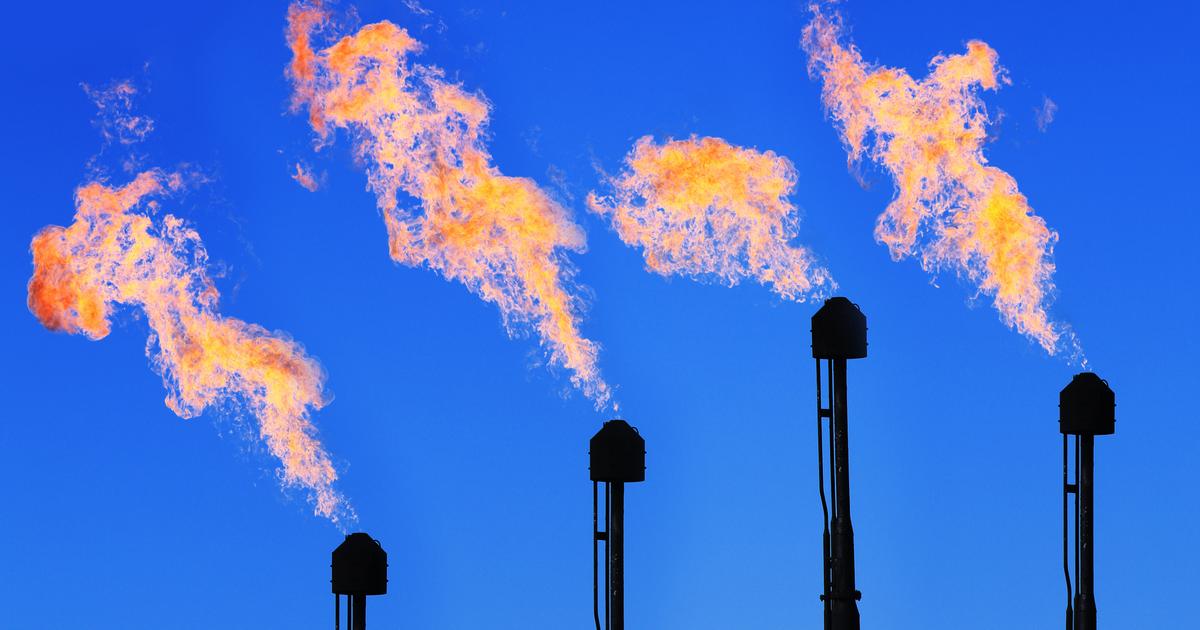An oil drilling rig located in the North Sea Arild Lillebø (Getty Images / iStockphoto)
Brussels has decided to put an end to methane, the second gas responsible for climate change, behind carbon dioxide (CO₂). The European Commission wants to force energy companies in the oil, gas and coal sector, responsible for 19% of these emissions, to detect and repair any leak located in their transport network, pipes and deposits. The Community Executive, who presented the new measures against climate change this Wednesday, also intends to prohibit routine burning and ventilation in fossil fuel plants, that is, the famous little flame that is often seen crowning the chimneys of energy infrastructures , almost a symbol of prospecting, and which Brussels considers a “common bad practice” and perfectly avoidable.The idea is to put out this flame forever.
The new proposal on methane comes in a week in which Brussels has put on the table an almost endless battery of measures aimed at the ecological transition, with initiatives of all kinds ranging from the energy efficiency of buildings to the promotion of the network community of railways or the regulation of the booming hydrogen and gas sector; It is the second hollow of the so-called European “green pact”, whose first impact came in July of this year, and has set in motion the machinery to approve a huge regulation, which will keep the European Parliament and the Council (the body that represents Member States) engaged in intense and complex legislative negotiation over the next few months or, most likely, years. All measures, led by the Executive Vice President of the Commission,Frans Timmermans, but who have demanded the coordinated action of different departments of the Community Executive, are heading to meet the objective that the EU has set itself to reduce greenhouse gases by 55% in 2030 and reach climate neutrality in 2050 .
More information
The European Commission sets the end of the sale of combustion cars for 2035
"Europe has to turn the page of fossil fuels and move to cleaner energy sources," said Timmermans.
"To address methane emissions, we propose a strong legal framework to better track and reduce this potent greenhouse gas, helping us meet the Global Methane Pledge and tackle the climate crisis," he added.
The objective of the measures of the Community Executive is "to reduce methane emissions from gas, oil and coal by 80% between now and 2030 and trigger action on methane outside the EU," added the Commissioner of Energy, Kadri Simson.
Methane gas, often forgotten, already monopolized the spotlight during the recent Glasgow climate summit, in which the EU and the United States pushed for an agreement together with more than a hundred countries to reduce emissions from source by 30%. anthropogenic in 2030 compared to 2020 levels. Large emitters such as Brazil, Indonesia, Canada, Saudi Arabia and the United Kingdom were added to the pact, but there were also enormous absences, such as those of China, Russia and India.
Methane is responsible for about 25% of the global temperature increase registered on the planet since the pre-industrial era, according to the latest report from the IPCC - the international panel of experts in charge of laying the scientific foundations on climate change. This gas also has a heating power 80 times higher than that of CO₂ in the first years after it reaches the atmosphere and is a powerful precursor of ozone, contributing to atmospheric pollution and affecting health, according to data provided by the Commission.
However, the European initiative faces the difficulty of regulating the energy sector beyond the borders of the EU, where 90% of oil and gas comes from, a figure that has been growing in recent years. The Commission has limited capacity to act in this field, but will entrust part of the strategy to its "diplomatic resources", indicate sources from the Community Executive. And it will seek to force corporations in the sector to increase transparency requirements in methane emissions linked to imports. Companies will have to provide detailed information on emissions outside the EU and the steps taken to mitigate them, data that will be published in a register on global methane emissions. The Twenty-seven will also allocateits fleet of European satellites to monitor hot spots with high methane emissions.
The new proposal does not enter into agricultural and livestock territory, the main responsible for emissions linked to human activity (around 25% of the total), so Brussels leaves powerful sources of methane such as belching from cows.
"Acting on the energy sector is more profitable," say community sources responsible for the new regulation.
The idea is that applying technological solutions, such as the monitoring and control of leaks in oil and gas wells, will obtain considerable reductions in emissions.
Sustainable buildings
The EU also aims to reach 2050 with a building stock that meets zero emissions targets. The proposal will require a profound transformation of the sector, where, on average, only 22% of the sources to heat and cool buildings, and 34% of the electricity they consume, has a renewable origin, according to 2019 data provided by the Commission. The Community Executive seeks to reduce energy consumption by 14% and promote the renovation of 35 million European homes. The core of the strategy will be to set minimum standards to be met by the worst energy-efficient buildings.
85% of homes in the EU were built before 2000, of which 75% have "poor" energy performance, and only 11% of buildings undergo some form of renovation each year, according to the Commission. .
And, currently, 15% of buildings in the EU have category G, the worst within the classification of the Energy Performance Certificate (EPC, for its acronym in English), in which A is the highest efficiency and lower climate cost.
Brussels intends to start the renovation with public and non-residential buildings: by 2027, those classified as G must, as a minimum, move to the next category, F. In 2030, they will have to climb another step, up to class E. In housing , Brussels gives a little more time: those of type G will have to become F in 2030, and ascend to category E in 2033.
The proposal also aims to promote the replacement of fossil fuel boilers by other systems without direct greenhouse gas emissions, such as heat pumps and other technologies based on renewable energies; Among other things, Member States will be prohibited from giving any financial incentives to the installation of fossil fuel boilers from 2027.
Aware that the measures can have a strong social cost and could deepen the gap of energy poverty, since often the least efficient homes correspond to the lowest-income households, Brussels intends to mobilize just over 200,000 million euros, from of the recovery plans agreed to get out of the pandemic hole and of the Social Climate Fund, a mechanism still in the negotiation phase aimed at alleviating the foreseeable cracks left by the ecological transition.
You can follow CLIMA Y MEDIO AMBIENTE on
and
, or sign up here to receive
our weekly newsletter









/cloudfront-eu-central-1.images.arcpublishing.com/prisa/RFXKLPJ6S5PGXJYGTELOFX5R6E.jpg)